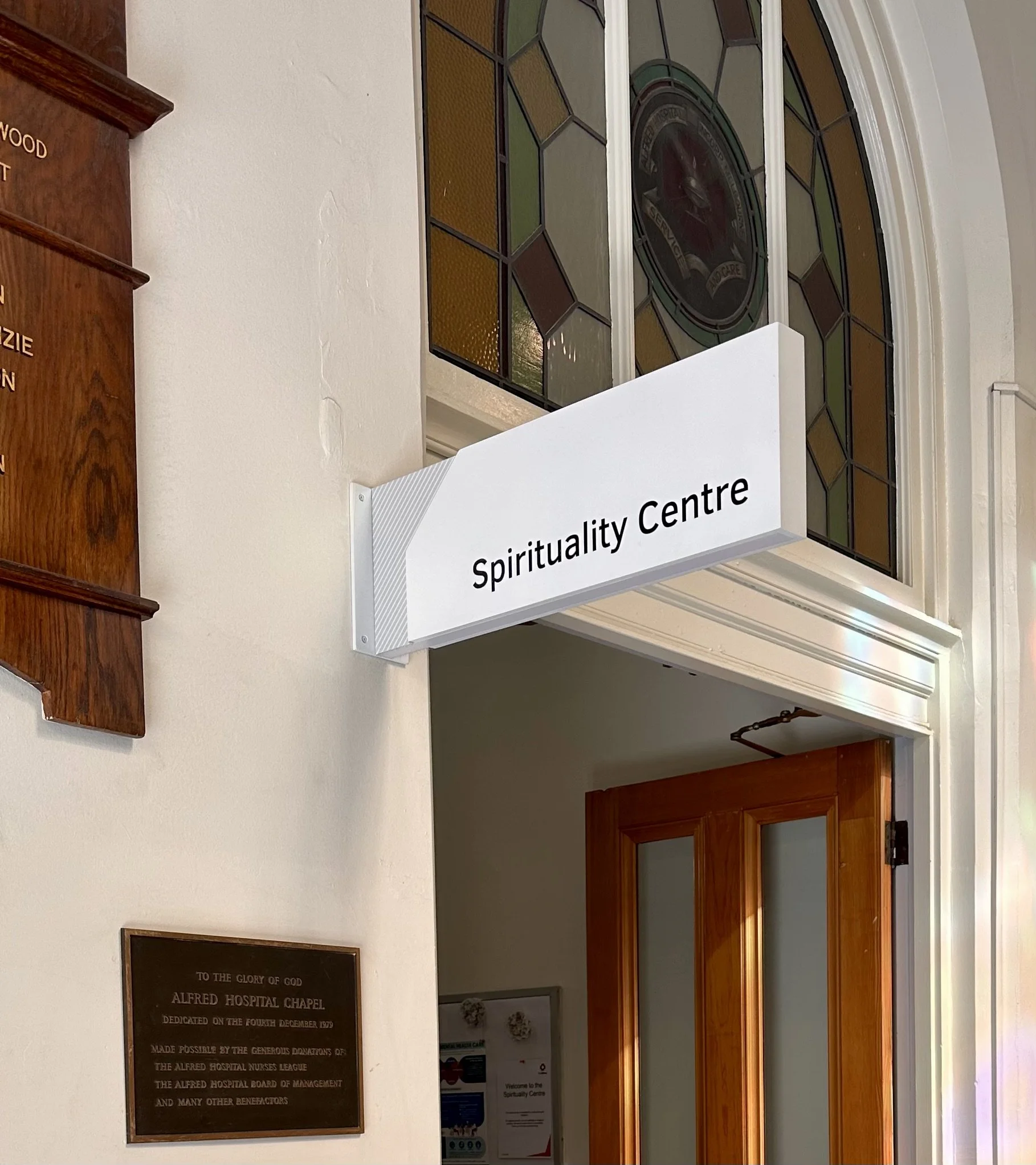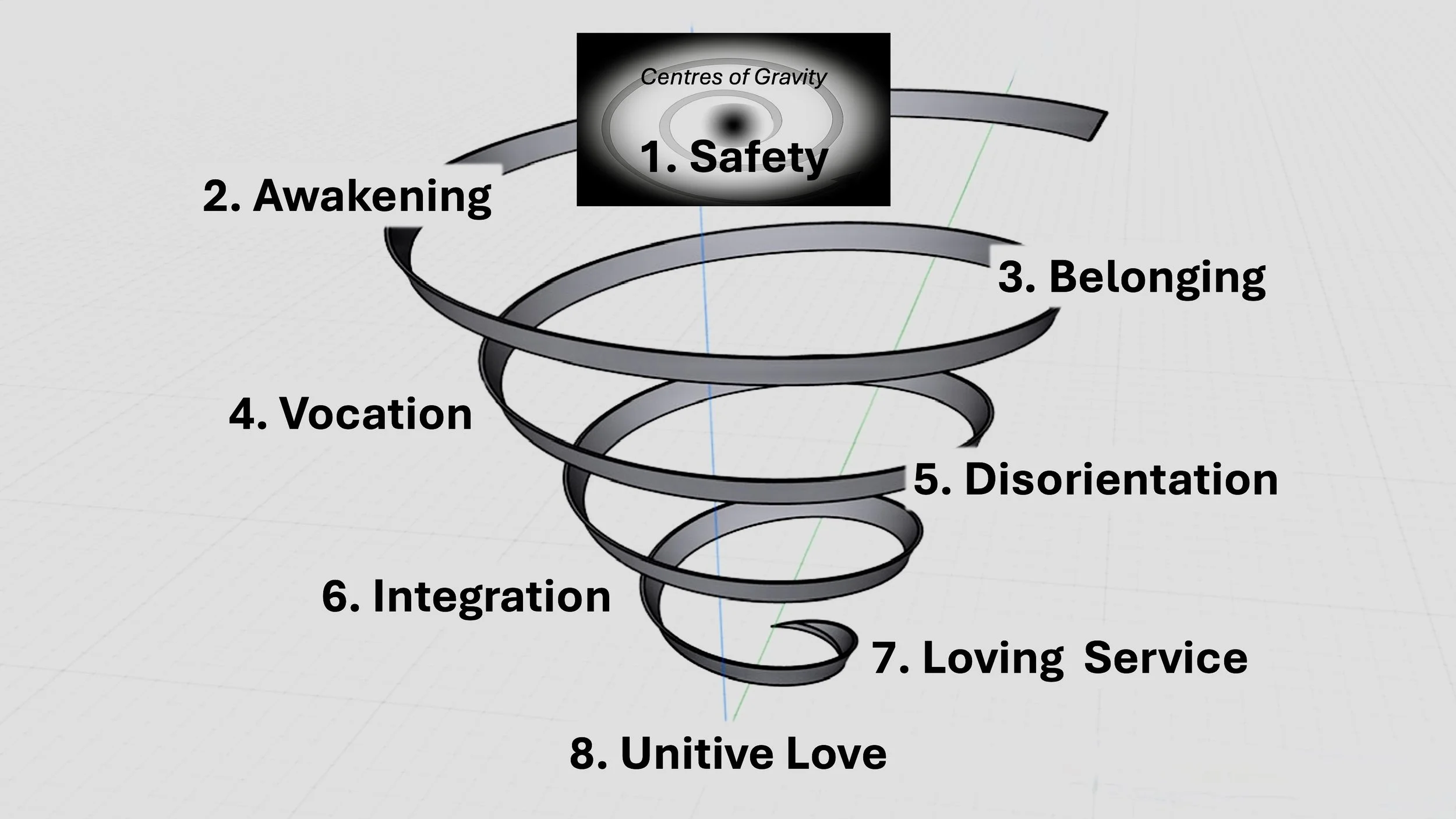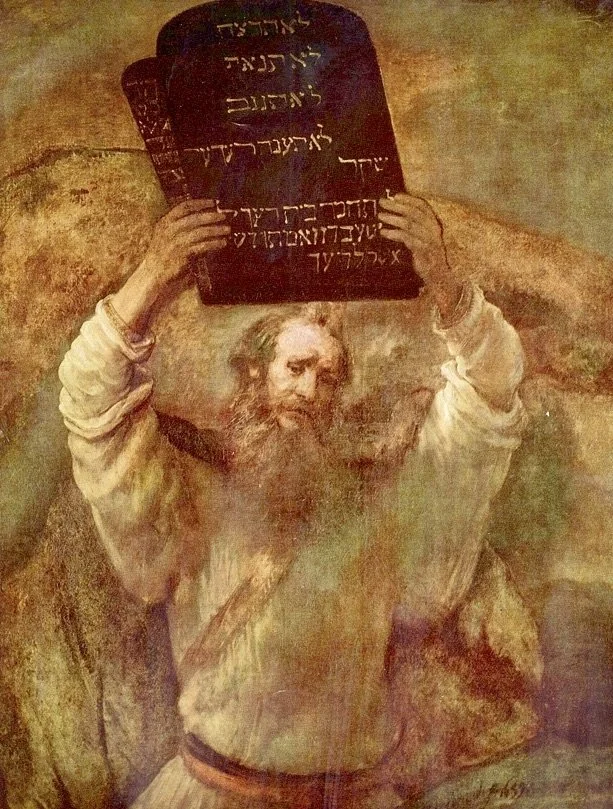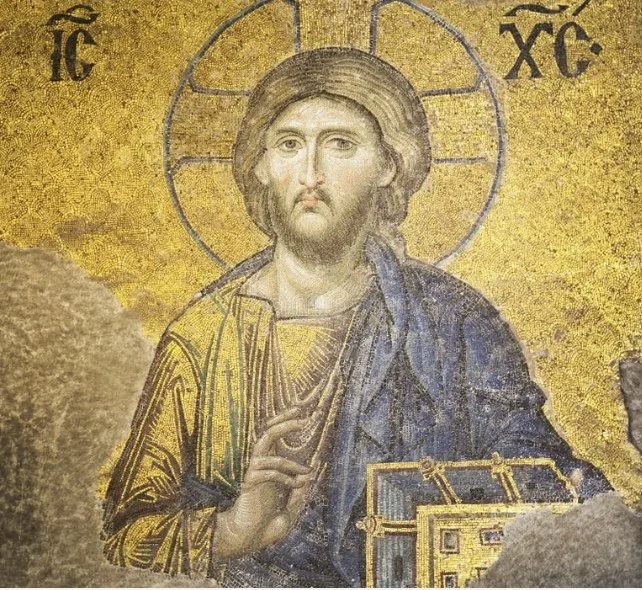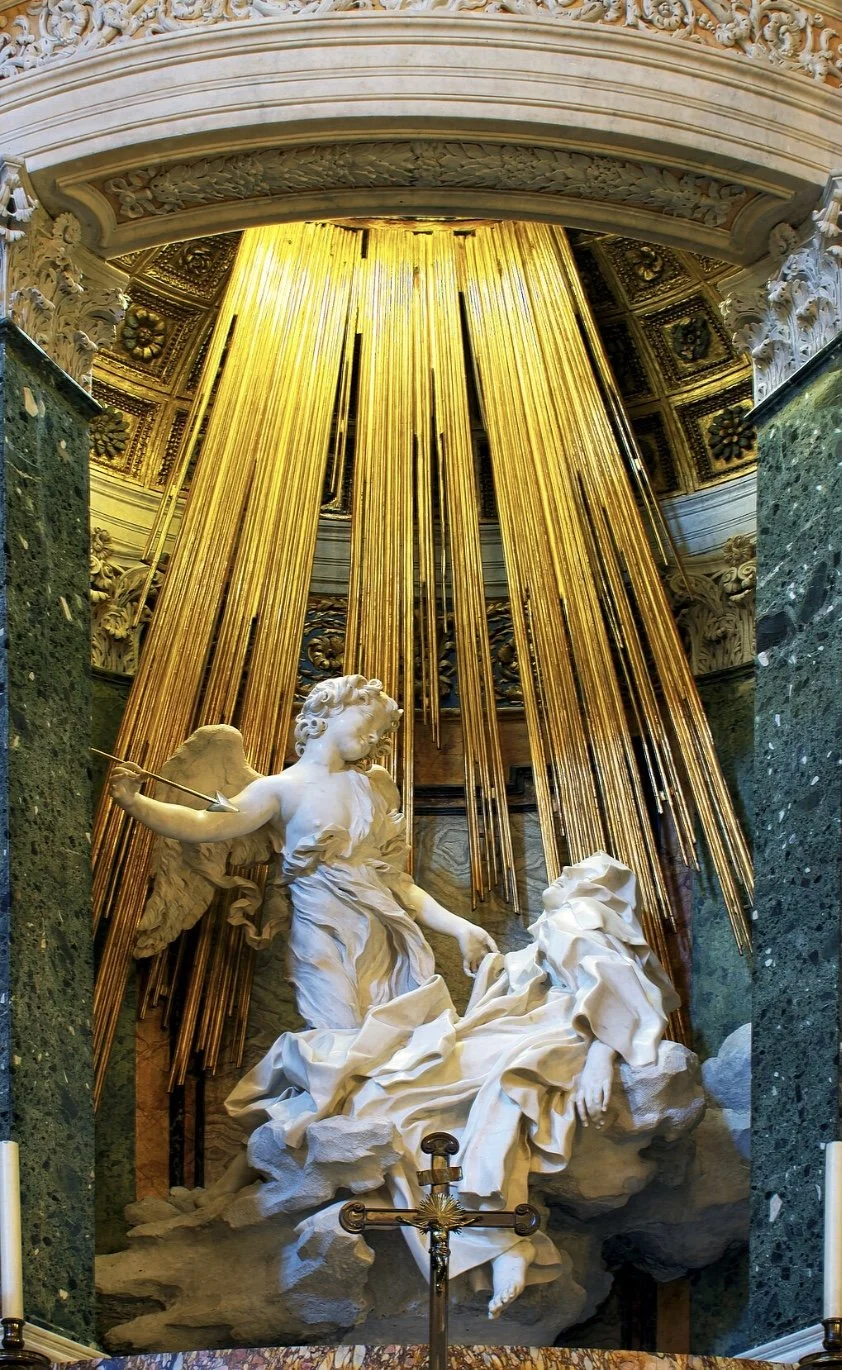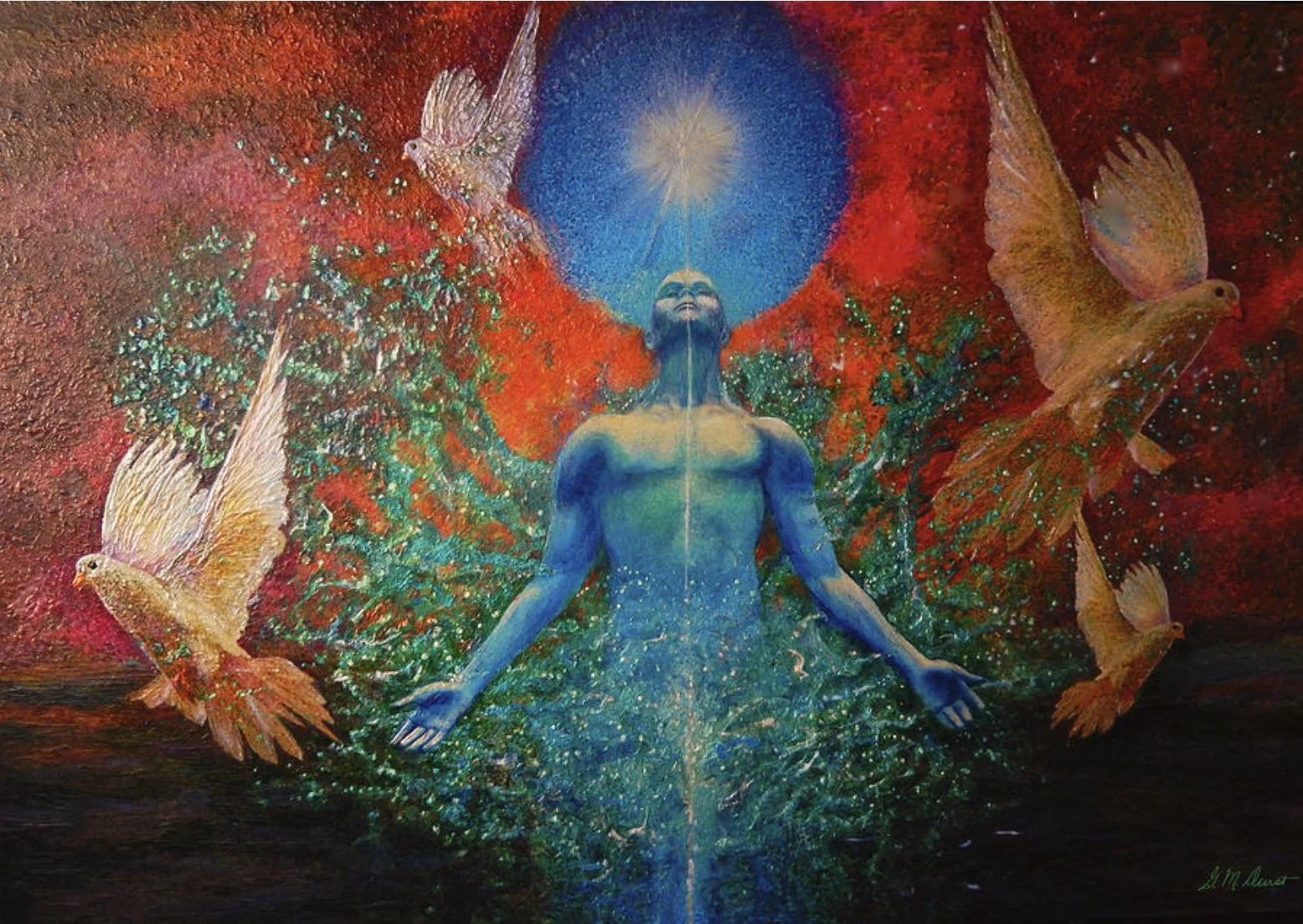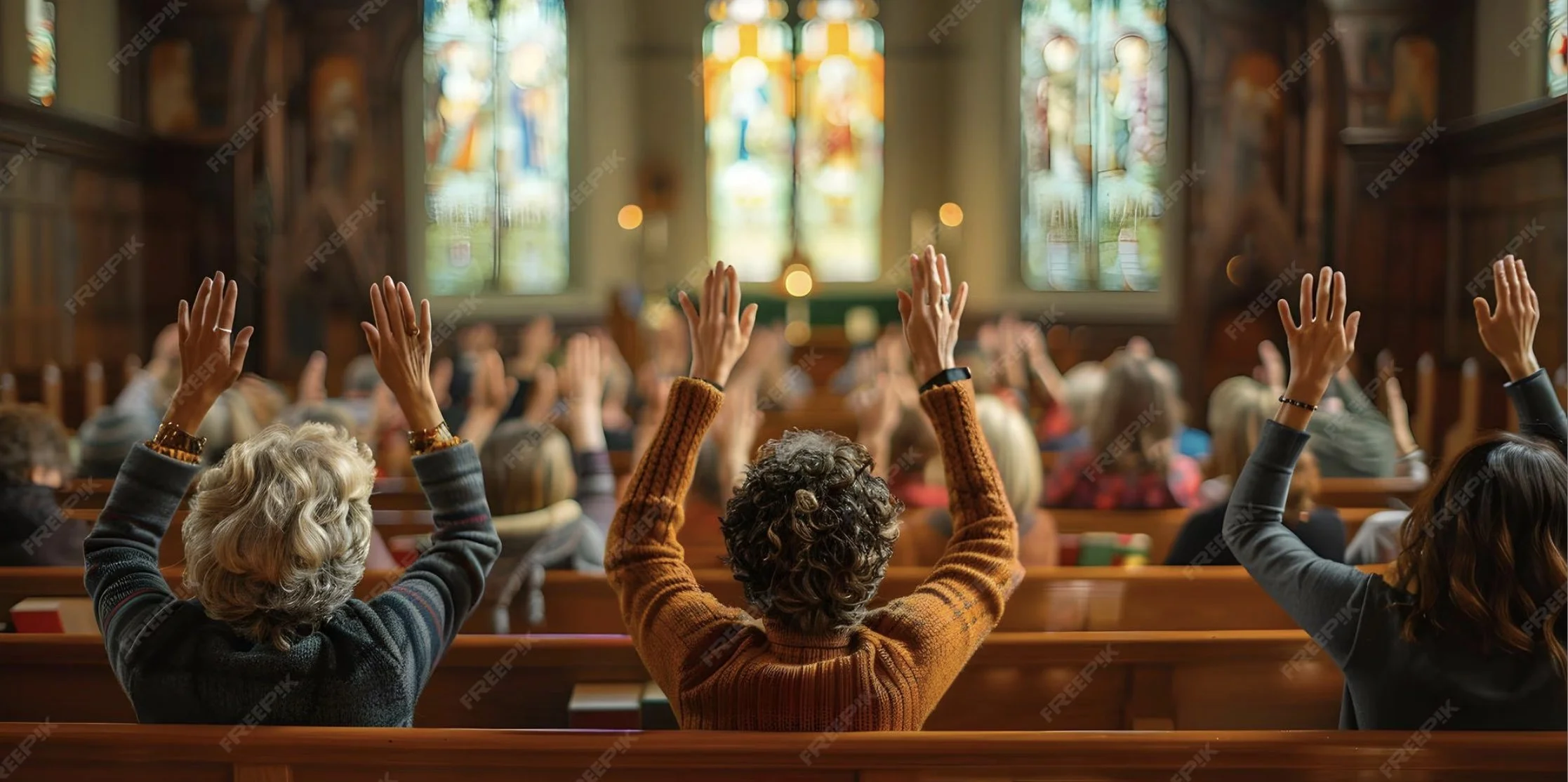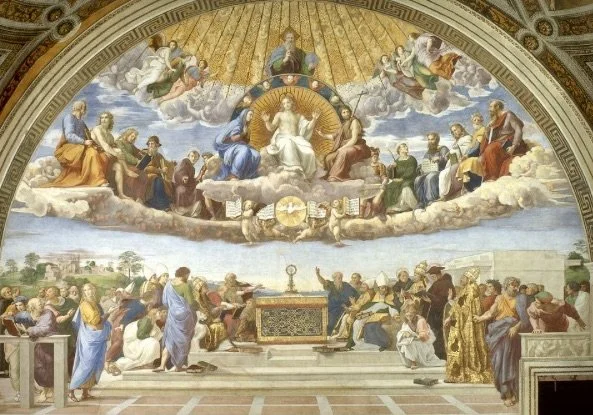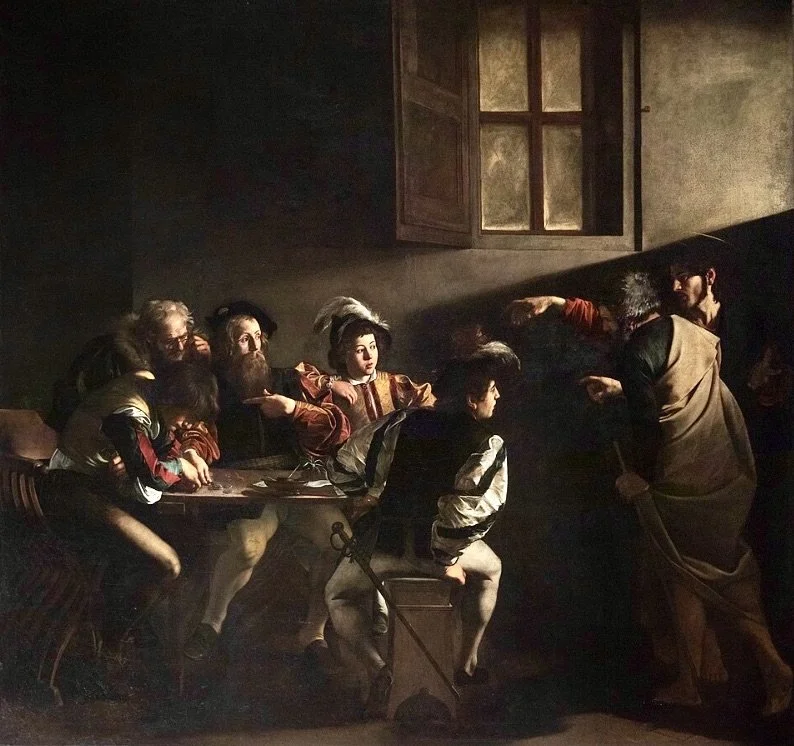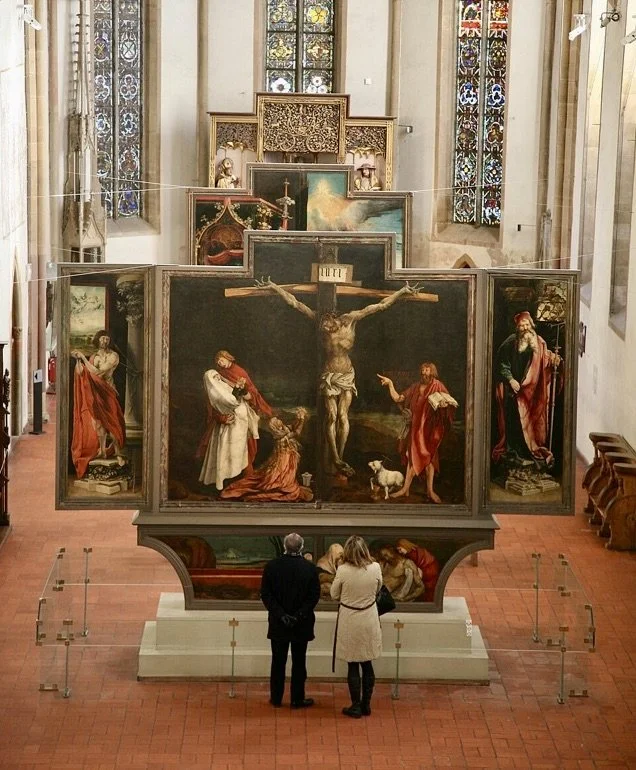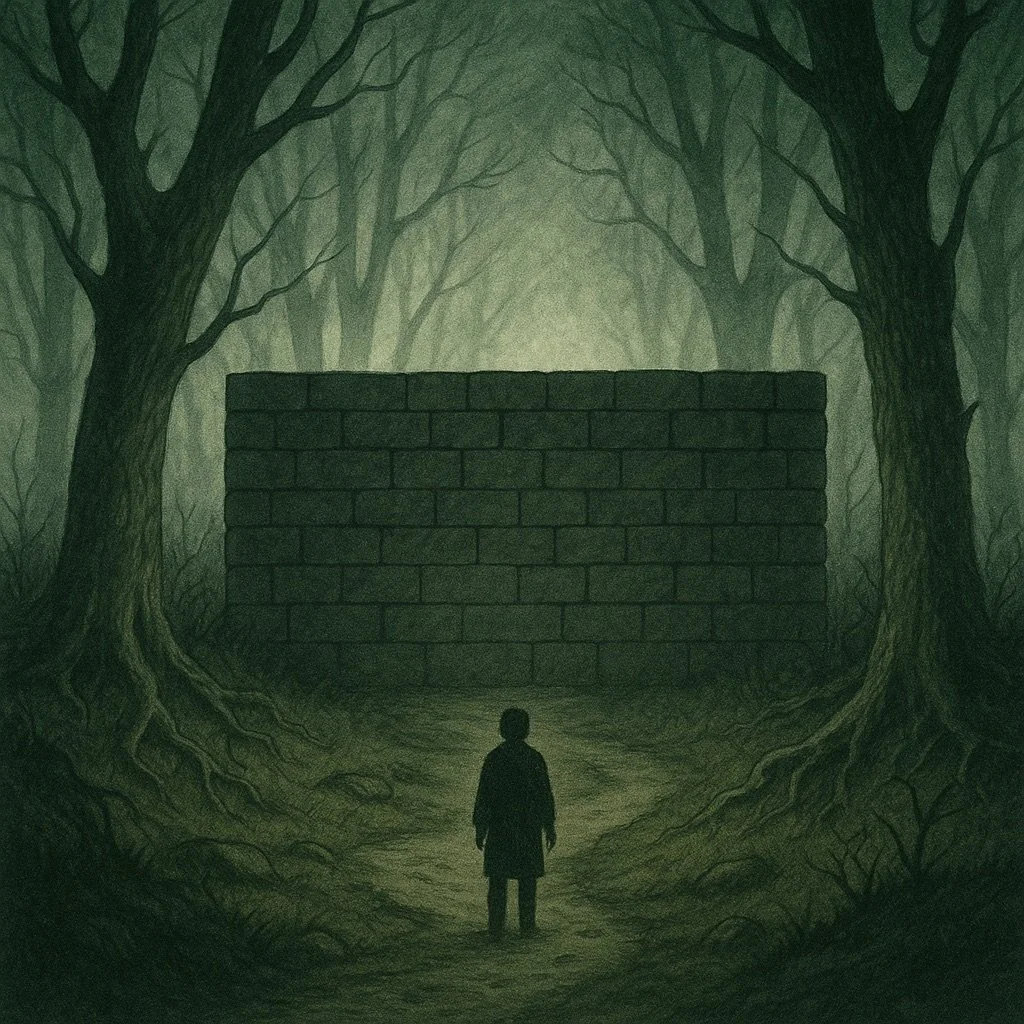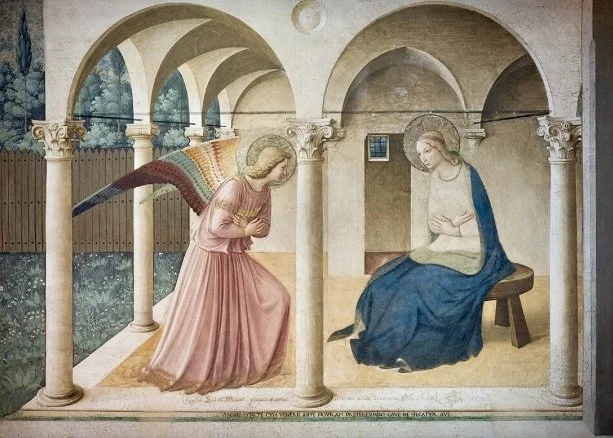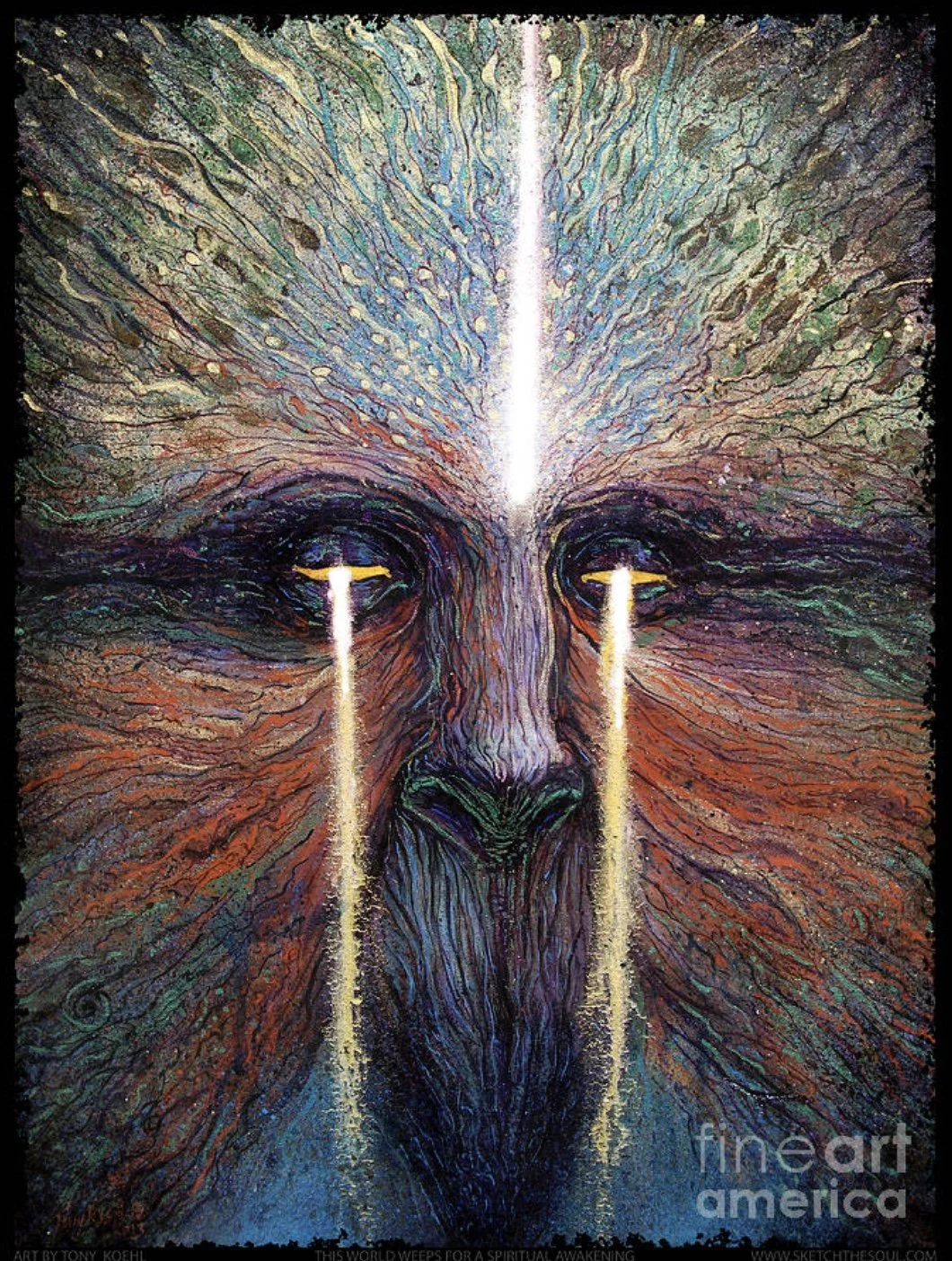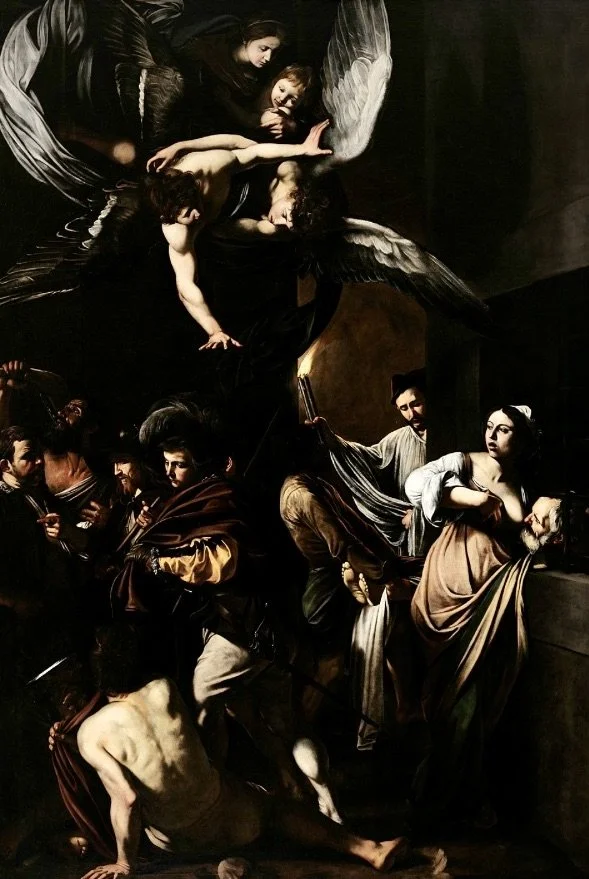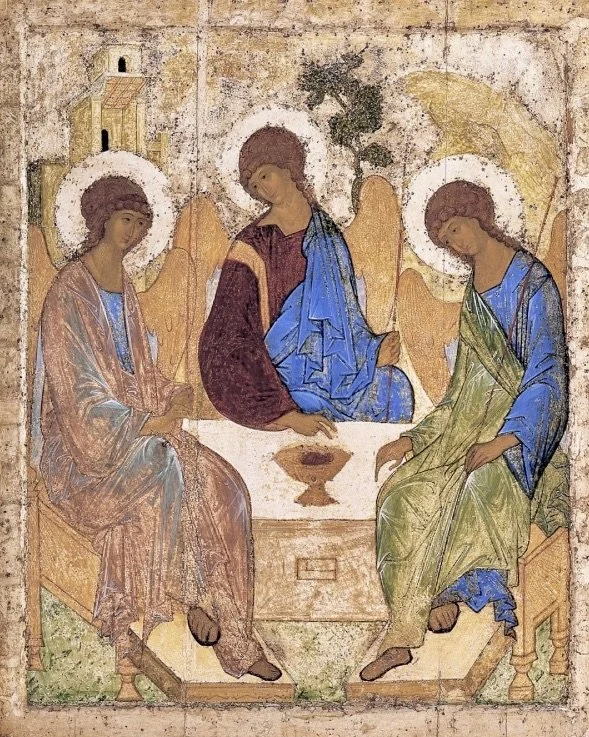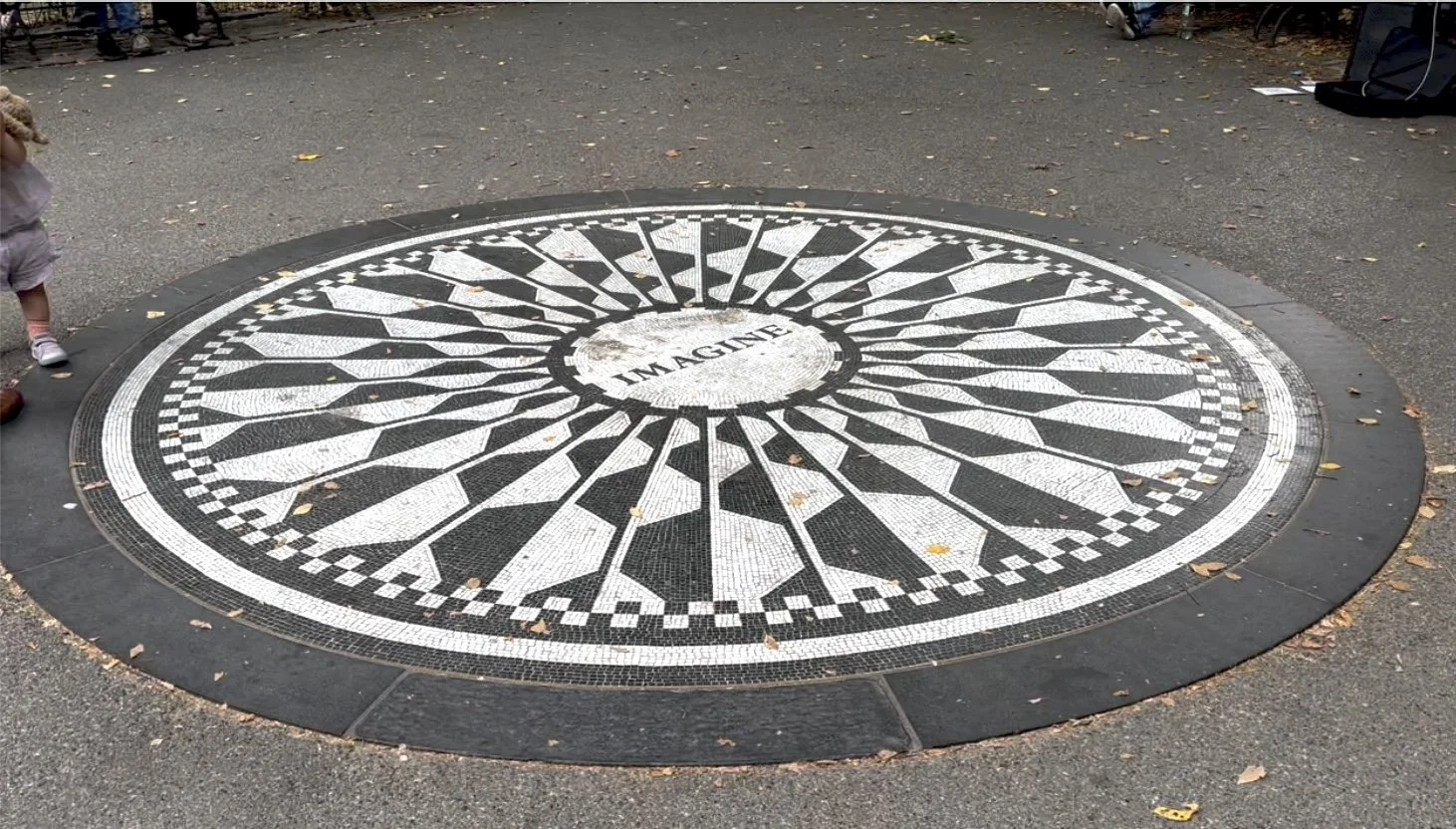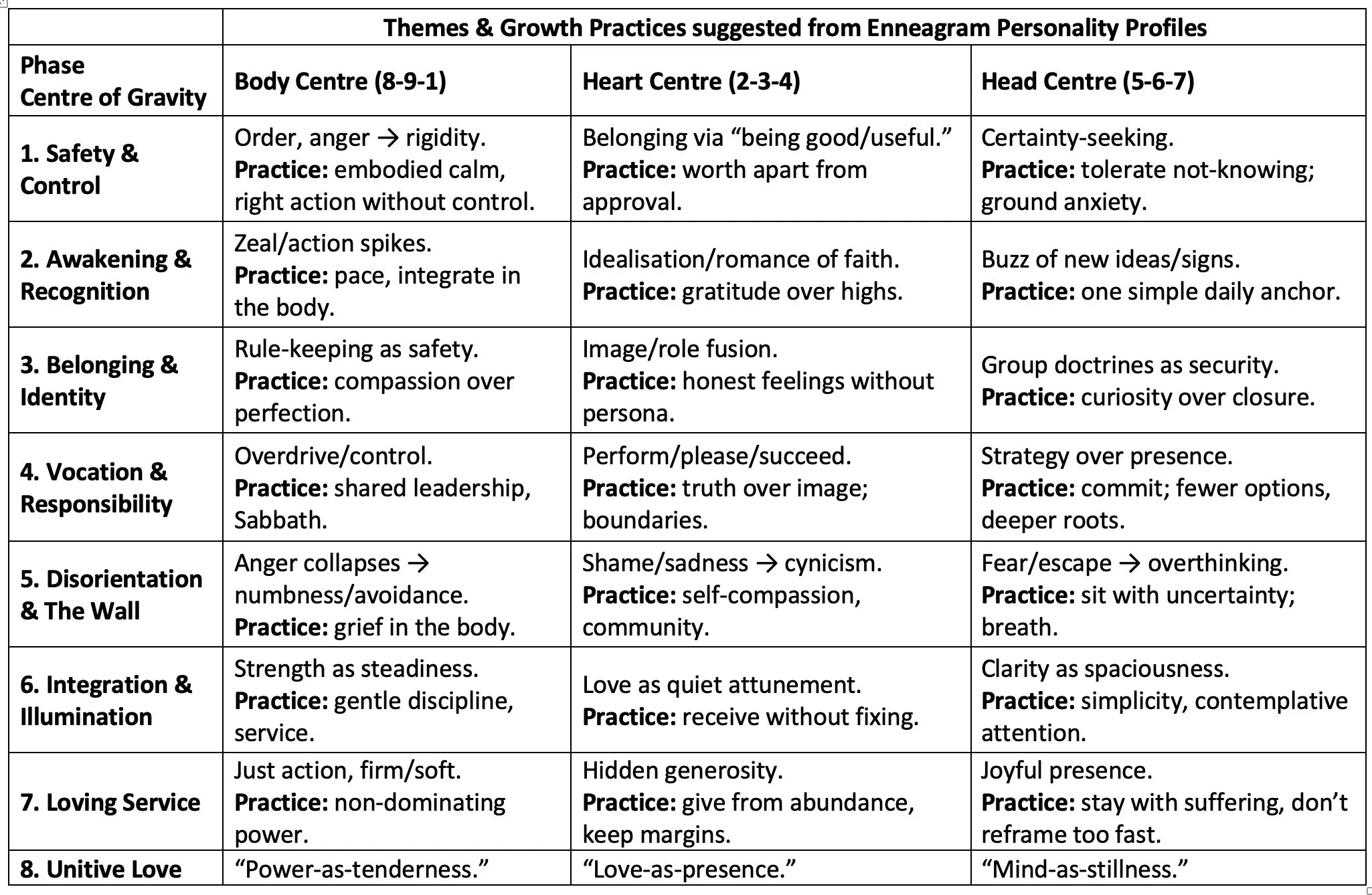A guide for spiritual seekers, leaders, and companions
© DR Phelan - Uplift Centre 2025
A Spiritual Journey across 8 Phases
This resource is the third in a series that sets out to describe stages of personal growth and formation on our lifetime journey. See The Hero’s Journey and Hero to Wise Elder for the other two in the series.
It offers particular insights into the Spiritual aspects of our journey, specifically the evolution of our lifetime search for meaning, purpose and deep joy.
Spirituality is often equated to religion and God. And whilst a view about God (however this is understood) is highly relevant, our journey is critically one of meaning-making, and maturing towards wholeness and wisdom. So, whilst religious faith has been history’s most prevalent way for people to find, construct and hold meaning about "how everything works", an atheist or agnostic can similarly progress through developmental phases, though framed in humanistic, naturalistic, or philosophical terms.
“Faith is not always religious in its content or context. Faith is a person’s or group’s way of moving into the force field of life. It gives coherence and direction to people’s lives, links them in shared trusts and loyalties with others, grounds their personal stances and communal loyalties in a sense of relatedness to a larger frame of reference, and enables them to face and deal with the limitations of human life and death.”
— James Fowler Stages of Faith, p. 4
Even when rejecting “God” language, most people still have a need for:
A story (where we came from, where we’re going)
A community (others who share values)
A moral compass (how we should live)
A sense of wonder or awe (whether directed at the cosmos, humanity, or love)
Or, as Douglas Adams famously puts it in “The Hitchhikers Guide to The Galaxy”: the Answer to the Ultimate Question of Life, the Universe, and Everything?. (42).
Spiritual trajectory
Across psychology, theology, and spiritual direction, many have observed that the spiritual journey and growth tends to unfold in recognisable phases and recurring movements. There seems to be a common trajectory that begins with an ego-centric, survival-driven mindset which, across a lifetime, can mature into a profound experience of love and unity with the transcendent divine. Buddhists might call this the path to enlightenment.
“The Transcendent Divine”
This “Transcendent Divine” has been known by many different names across the ages. I have used “God” and historical Christian examples in the descriptors below.
However, it’s helpful to remember there are many other names used to describe what/who I am calling “God” : In the Biblical Old Testament Yahweh, Elohim, Adonai, El Shaddai and Shepherd (23rd Psalm - The Lord is my Shepherd) are used.
In the New Testament John uses the terms Logos (“Word,” John 1), Light (John 8:12) and Love (1 John 4:8), and Jesus prays to his Abba (Father).
And there are hundreds of other names and understandings: Allah (Islam: “The God”), Brahman (Hinduism: the ultimate reality beyond form), Tao (Taoism: “The Way,” the source and flow of all things), Dharmakaya (Buddhism: cosmic body of truth), The Great Spirit / Wakan Tanka (Indigenous North American traditions), Dreaming / Ancestor Spirits (Australian Aboriginal spirituality). In Freemasonry, the Deity is referred to as the “Great Architect of the Universe”. Some refer to The Universe (New Age), Higher Power (12-step traditions), The More (William James, Varieties of Religious Experience), The Beloved (Rumi, Sufi poetry; also Teresa of Ávila), The Sacred, The Essence or Presence. Mystics have referred to The Cloud of Unknowing, and Paul Tillich describes the “Ground of all Being”…..
Whatever names or beliefs we hold or don’t hold, we all have a deep need for meaning, connection, purpose and wholeness. Our lifetime quest for deep happiness is ultimately rooted in these needs and our soul’s search for pathways to take us to a deeper wisdom..
If our journey takes us through the full spiritual trajectory, we have identified eight phases or centres of gravity the we might experience.
The Eight Phases of the Spiritual Journey
Centres of Gravity rather than a “Ladder of Worth”
It can be helpful to think of the eight phases described below as orientations we are drawn towards, rather than a “ladder of worth” that we climb (perhaps quietly feeling better than those on the rungs underneath). Each phase is more like a centre of gravity that draws together our understanding of ourself in relation to God / our Ground of all Being .
“Each stage is not only a matter of new contents of faith but a matter of the kind of knowing, valuing, and composing of the world that is possible at that stage. Movement from one stage to another involves not only changes in ways of believing but in the structural integrity of faith itself.” — Fowler, Stages of Faith, p. 47
The phases are not just about changing beliefs but about changing structures of meaning-making— the very way people hold and interpret their lives. Each phase offers unique lessons. The experiences of many shows that growth is often non-linear - people move back and forth, straddle stages, or “recycle” earlier outlooks when life circumstances change….until a new phase seems to coalesce. There is no skipping ahead to avoid the hard work of a given phase. In short, the path is more like a spiral of unfolding depth rather than a straight climb upward.
With this in mind, we have outlined a framework of eight stages that attempts to braid together core insights from the wise elders who have travelled before us. There are descriptors for each stage together with pointers to movement, growth and transition. You are encouraged to identify with where you think you’re currently at without judgment. Every stage has its own gifts and challenges. The goal is not to somehow force ourself into a different phase (which you can’t do authentically), but rather to fully experience and learn from each stage, allowing grace to move us toward greater love.
© 8 Phases (like centres of gravity) in a spiral of unfolding depth - Uplift Centre 2025
The Eight Phases
1: Safety & Control
In this initial stage, individuals seek safety, certainty, and clear moral structures. God is perceived as an all-powerful authority.
Rembrandt, Moses with the Ten Commandments (1659), Gemäldegalerie, Berlin.
Law, order, boundary-setting: the archetypal image of moral scaffolding and sacred rules.
Example of a person at this phase: A new believer / convert finding comfort in strict religious rules and knowledge that God will look after them if they obey his rules..
People at this phase are generally seeking: Safety, certainty, clear morals
God is mostly seen as: Rule-maker, powerful external authority who blesses/punishes; religion is understood as a behavioural contract i.e. if I do the right things, God will look after me / us
Gifts of being in this phase: Order, predictability, moral scaffolding, sense of belonging, life structure
The Challenges of being in this phase: legalism, fear-based religion, rigidity, magical thinking, us/them tribalism, authoritarian capture.
Common defences of individuals in this phase: Projection (“the bad is out there”), splitting (all good/all bad), over-compliance or defiance.
Christ Enthroned in Majesty (4th-century apse mosaic), Basilica of Santa Pudenziana, Rome. Christ seated on a jewel-encrusted throne, wearing gold and purple robes—symbols of imperial authority—while holding a book inscribed “Dominus conservator ecclesiae Pudentianae” (“The Lord is protector/preserver of the Pudenziana Church”) and making a gesture of blessing.
People at this phase often show the following dwelling markers: High anxiety when rules/authoritative sources are challenged; dependence on external validation.
Scriptural/theological echoes of this phase: Mount Sinai Tablets from God (Exodus 19–20..23); Proverbs pedagogy / teachings; Job’s friends’ retributive theology (Job 4 onward).
Helpful Practices for people in this phase: Structured rituals / prayer routines (e.g., daily Psalms reading), Regular community worship, supportive communities
Transition signs of growth - signs of transitioning to a next phase: Genuine curiosity; cracks in certainty; compassion breaking through black/white categories.
Reflective Questions:
When do you feel safest spiritually? What are your current spiritual anchor points?
Are there times when you’ve felt anxiety or anger when your beliefs have been challenged?
Is there a seed of new growth that you sense a prompting to explore further?
2. Awakening & Recognition
This stage is characterised by connection, awe, and a personal experience of grace. God feels intimately present and protective. Can feel like God has found me.
Gian Lorenzo Bernini, Ecstasy of Saint Teresa (1647–52), Cornaro Chapel, Rome
A visceral image of being overtaken by grace—startling encounter and surrender.
Example: A profound conversion experience or spiritual awakening.
Seeking: Connection, awe, grace, say a trusting “yes” to a larger Story/Presence; signs and wonders
God is: Loving protector, personal friend, intervening for my betterment; experience of being found.
Gifts: Joy, wonder, hope, zeal, teachability, spiritual hunger, feeling spiritually alive
Challenges: Idealization of leaders, chasing emotional highs, spiritual consumerism
Common defences: Denial of suffering/ambiguity/numbing; spiritual bypass via euphoria.
Dwelling markers: Chasing emotional highs; conflating God’s presence with felt consolation.
Spiritual Awakening — Michael Durst (mixed media) 2020
Scriptural/theological echo: Paul’s Damascus encounter (Acts 9:1–19); the Psalms of rescue / deliverance; the prodigal found (Luke 15:20–24).
Helpful Practices: Gratitude journaling, testimony/story-sharing, imaginative prayer, praise/worship, foundational study
Transition signs of growth: Desire for more substance, doctrine / theological understanding, community roots; sobriety after first enthusiasm.
Reflective Questions:
Recall an experience of awe that opened your heart spiritually - what were your feelings? your thoughts?
How might emotional intensity mask deeper spiritual questions?
Is there a sense that further study / reading might take you deeper?
3. Belonging & Identity
Characterised by community identity, moral clarity, belonging and conformity. God is our guardian.
Raphael, Disputation (Disputa) over the Most Holy Sacrament (1509–10), Vatican Stanze.
Truth is sought both through faith and through reason. Communal coherence: church, doctrine, and worship knit the individual into a body with shared belief and practice.
Example: Belonging to a faith community and deeply adopting its beliefs and practices. We are the true church.
Seeking: an internalised coherent framework and a communal moral compass, clear identity
God is: Guardian of our group and traditions, guarantor of order and correctness.
Gifts: Moral clarity, discipline, solidarity, service, tradition transmission, clear guidance, loyalty
Challenges: Rigid certainty, avoiding questions, group conformity, in–out tribalism, suppression of doubt, authoritarian dependence
Common defences: Rationalization, groupthink, scapegoating dissenters.
Dwelling markers: Anxiety around ambiguity; fragile identity when challenged.
Scriptural/theological echo: Pastoral epistles shaping order (1 Timothy, 2 Timothy, and Titus); Jesus’ critiques of performative religiosity (Matthew 6:1–18).
Helpful Practices: Group worship, meaningful liturgy, mentorship, service with others
Transition signs of movement to new stage: Emerging dissonance, questioning arising from suffering, hunger for authenticity.
Reflective Questions:
How has your community shaped your spiritual identity?
Are there doubts you fear exploring due to community pressure?
Is there a practice that might help you on your path to greater authenticity / True Self
4. Vocation & Responsibility
Focused on vocation, leadership, and meaningful work. God is seen as a partner and calling-giver.
Caravaggio, The Calling of Saint Matthew (1599–1600), San Luigi dei Francesi, Rome.
Vocation and agency: the decisive summons into purposeful mission—leadership born from responding to a call.
Example: Leading a ministry or community project that has “kingdom” / “making the world a better place”, meaning
Seeking: Productive purpose, calling, identity integrated with meaningful work - vocation/ministry/mission
God is: Partner, calling-giver, mission-giver, coach, partner;
Gifts: Courage, leadership, entrepreneurship, innovation, community impact.
Challenges: Burnout, over-identification with work, saviour/messiah complex, activism as avoidance of interiority
Common defences: Overwork, perfectionism, spiritualized grandiosity, control disguised as care.
Dwelling markers: : Chronic fatigue + indispensability narratives; dismissal of contemplation.
Scriptural/theological echo: Martha’s anxious serving (Luke 10:38–42); Paul’s thorn (2 Corinthians 12:7–10); Elijah’s collapse under the broom tree (1 Kings 19:3–9).
Helpful Practices: Rest (Sabbath), Rule / rhythms of life, spiritual mentorship, self-reflection, Lectio Divina, shared leadership.
Transition signs of movement to new stage: Disillusionment, failure, moral injury, or success that still feels empty.
Reflective Questions:
“When have I felt called to step forward into a role of service? How does faith inform what I choose to do and how I lead?”
Reflect on how you are spending your days and weeks right now - What is the balance of your attention on “Doing” compared to ‘Being”? Why is that?
How can rest enhance rather than threaten your spiritual purpose?
5. Disorientation & The Wall
A challenging stage marked by doubt, grief, and spiritual silence, feelings of being in the wilderness
Matthias Grünewald & Nikolaus Hagenauer, Isenheim Altarpiece (1512–16), Musée Unterlinden, Colmar.
Cruciform anguish and transfiguration: the work’s raw pathos and luminous openings embody dark night → new life.
Example: Experiencing profound loss or a crisis of faith
Seeking: Deeper trust and surrender; to be able to let go of control and previous images of God that no longer hold meaning and comfort; to find new identity fusions;
God is: Silent, absent, non-existent or mysterious
Gifts: Honesty, depth, authenticity, humility, freedom from illusions, deeper compassion
Challenges: Doubt, grief, feeling alone, cynicism, nihilism, paralysis, de-conversion without integration
Common defences: Intellectualisation, permanent deconstruction, bitterness, self-exile.
Dwelling markers: Prolonged cynicism, identity built on analytical critique, spiritual numbness.
Scriptural/theological echo: Job’s protest (Book of Job, especially chapters 3–31); Jesus’ cry of forsakenness (Matthew 27:46); the “cloud of unknowing.”
Helpful Practices: Silence, spiritual companionship, lament psalms and journaling, centring prayer, wilderness retreats
Transition signs of new growth: Gentle openness, capacity to grieve, feelings of surrender, re-emergent tenderness, contemplative hunger,
Expanding on “The Wall” : Embracing the Turning Point
The Wall is a key transformation point
Many encounter a "Wall"—often in phase five—marked by loss, confusion, or divine silence. The Centre of gravity of this developmental phase is deconstruction, grief, impasse, dark night of the soul. Core markers include loss of God’s felt presence, collapse of explanatory frameworks, and forced surrender of identity-fusing roles e.g. “Going to church feels meaningless / hypocritical, as I’m no longer sure there is a God.” “I no longer identify as a Christian, given some of the judgemental stances of church leaders”… It can feel like being lost in a dark foreboding forest.
There are similar psychological and emotional aspects metaphorically described in stages 7&8 of the Hero’s Journey (See Approach to the Inmost Cave and The Ordeal in the Abyss) and some examples in The Crucible of Adversity in Hero to Wise Elder.
However, the spiritual wall and the psychological abyss don’t always occur together. Whilst they often do, it is not uncommon to be going through a terrible ordeal yet feel that God is close and with you. Conversely, it is possible to be experiencing great public “success” and recognition yet feel spiritually lost or even dead inside eg. pop, media or sporting stars that self-destruct.
In spiritual terms, The Wall is is a key transformation point. It is the turning of the ego: where our will meets God’s Will (Hagberg & Guelich), where faith’s container shatters (Rohr’s “disorder”), where we encounter impasse and the dark night (FitzGerald, John of the Cross).
However, as difficult and uncomfortable as the Wall is - and this pain of inner transformation may last for years - It is ultimately an invitation to go deeper. It is a chance to explore new pathways, let go of old certainties, and to find deeper truths.
We would wish it otherwise, but It is almost always a painful transition and transformation. Richard Rohr observes that our ego and its container always resists surrender and loss of control. Our ego will defend, project, and attack so as to avoid giving up our centre stage and being dismantled. “The ego hates losing—even to God.” (Falling Upward). Rohr calls the ego/“false self” a necessary first-half-of-life identity that must be let go so the “true self” can emerge. But it almost always takes being smashed by loss, suffering, illness, defeat / humiliation / “dying”, before this happens and the possibility of rebirth and renewal can begin. Rohr says our journey is about relinquishing control (not tightening it), and learning to serve something larger than the ego’s projects (i.e one eye in the mirror all the time). For a lot of people, this authentic service phase does not happen until much later in life - if at all.
Thomas Merton, the American Trappist monk and mystic, similarly says spiritual development is a journey from the false self (ego, illusion, role-playing) to the true self (our identity hidden in God). “To be a saint means to be myself... Therefore the problem of sanctity and salvation is in fact the problem of finding out who I am and of discovering my true self.” (New Seeds of Contemplation).
Bottom line about the “Wall”: The ego will not step aside or let go on its own; it usually takes failure, “falling,” suffering, and loss of role-identity for our spiritual centre of gravity to shift from egoic control, to a life that is open to and led by grace (the “true self”)
So, the wisdom of past travellers is to take your time here. Grieve, reflect, and trust the process.
Reflective Questions:
Are there some “certainties” or identity labels that might be useful to surrender / let go of?
If I let go, who am I? What do I stand for?
Is it possible to hold paradoxes and move forward? For example, suffering and a Loving God?.
Is this a Winter season that will pass? What might Spring look like for you?
6. Integration & Illumination
This Centre of gravity has a strong seeking for inner peace, centring, wholeness, and union with the divine.
Fra Angelico, Annunciation (c.1440–45), Convent of San Marco, Florence (stairway fresco).
Quiet, interior light: stillness, humility, and consent (Mary’s “yes”) as the posture of deep inner union.
Example: Experiencing consistent inner peace despite external chaos; a feeling of having emerged from the wilderness with a deeper, more integrated understanding.
Seeking: Wholeness, inner peace; to integrate head, heart, body, shadow, live from inner union
God is: An inner presence, gentle guidance, sacramentality of the ordinary; God in daily life.
Gifts: Calm presence, humility, interior freedom, acceptance of life's paradoxes, deep compassion.
Challenges: Feeling misunderstood by others in different phase, detached, subtle spiritual superiority
Common defences: Quietism, tendency to use a calm spiritual posture (like “everything happens for a reason” or “I just trust God”) to avoid facing uncomfortable emotions or truths.
Dwelling markers: Stable contemplative rhythm; capacity to hold paradox without reactivity.
This World Weeps for a Spiritual Awakening — Tony Koehl. Fine Art America
Scriptural/theological echo: “Christ in you, the hope of glory” (Colossians 1:27); Peter post-breakfast restoration (John 21:15–19); Emmaus burning hearts (Luke 24:32).
Helpful Practices: Contemplative prayer, creative expression, time in nature, Daily Examen, contemplative embodiment practices (yoga, breath work)..
Transition signs of movement: Desire to give away what one has become; natural movement toward hidden service.
Reflective Questions:
When have you experienced inner peace? Is there a place, memory, practice or stance that facilitates this for you?
How might you further develop awareness of God’s Holy presence in every thing that comes to you in your day?
Is there an emotional discomfort you are avoiding through a spiritual posture?
7. Loving Service
Characterised by focus on selfless service and compassionate action from a feeling of abundance.
Caravaggio, The Seven Works of Mercy (1607), Pio Monte della Misericordia, Naples.
Love-in-action: feeding, clothing, visiting, sheltering—mercy rendered as concrete, embodied service.
Example: Quietly supporting marginalised individuals or groups.
Seeking: Loving service, genuine compassion, love-in-action from abundance, not compulsion; to translate union with God’s spirit into justice, mercy, and presence;
God is: Co-labouring Spirit; divine compassion, companion in suffering,
Gifts: Healing presence, gentle guidance of others, reconciliatory leadership, graceful activism.
Challenges: Compassion fatigue, setting boundaries
Common defences: Over-functioning disguised as service; conflict avoidance.
Dwelling markers: Sustainable service, comfort and joy without spotlight
Scriptural/theological echo: The Good Samaritan (Luke 10:25–37); Barnabas the encourager (Acts 4:36–37…); Dorcas/Tabitha’s quiet works of mercy (Acts 9:36–42).
Helpful Practices: Deep listening, mentoring, restorative self-care, simplicity, spiritual eldership.
Transition signs of growth: Deepening anonymity, effortless blessing - less up front, more supporting others; decreasing reactivity.
Reflective Questions:
How do you discern genuine generosity from compulsive / “should” giving?
Is your service to others, life-giving to you and them?
What boundaries help you sustain compassionate service?
8. Unitive Love – "I am one with all"
This stage is marked by profound unity, peace, and unconditional love; humility and groundedness. In his book Stages of Faith, Fowler calls this the final stage
Andrei Rublev, Trinity (c.1411 or 1425–27).
Relational oneness: the iconic circle of hospitality and mutual indwelling—unity without erasing difference.
Universalising Faith. People at this stage live with such radical love, compassion, and justice that they transcend boundaries of tribe, creed, or institution. People embody selfless, boundary-breaking love. It is less about belief systems and more about embodied presence, courage, and compassion.
These are seen as the saints. Most people never reach this stage, regardless of religion.
Example: Living with serene joy and spontaneous acts of kindness. See below
Seeking: to empty ourselves and have God flow through us to others; becoming love itself; life as prayer
God is: Present in everything, universal love
Gifts: Wisdom, peace, profound simplicity, spontaneity of love, joyful presence
Challenges: Being misunderstood, others’ expectations
Common defences: Few; ego games largely dissolved—yet prudent boundaries remain
Dwelling markers: Serene joy, radical inclusion, forgiveness as reflex, anonymity embraced.
Scriptural/theological echo: : “I no longer live, but Christ lives in me” (Galatians 2:20); Jesus’ unity prayer (John 17:20–23); “God is love.” (1 John 4)
Helpful Practices: Silent abiding, quiet presence, blessing others, finding the sacred in everyday moments
Some illustrations of this stage 8 from Literature / Cultural / Historical Figures
Julian of Norwich, Revelations of Divine Love
“All shall be well, and all shall be well, and all manner of thing shall be well.” A vision of serene, all-embracing divine love.Rumi (13th c. Sufi poet)
“Out beyond ideas of wrongdoing and rightdoing there is a field. I’ll meet you there.”Thomas Merton, New Seeds of Contemplation
Speaks of discovering the true self in God, where we live no longer for ourselves but as channels of divine love.
Mahatma Gandhi
His practice of nonviolent resistance (satyagraha) embodied love in action, breaking through boundaries of empire and violence.Martin Luther King Jr.
Preached and lived nonviolent love and reconciliation, even in the face of hatred — a radical embodiment of unitive compassion.Mother Teresa of Calcutta
Life devoted to the poorest, showing love not as sentiment but embodied presence to suffering.
“Imagine” mosaic in Strawberry Fields, Central Park, New York - John Lennon’s song about peace and unity
Desmond Tutu, Ubuntu
His teaching: “My humanity is bound up in yours, for we can only be human together.” A modern African articulation of unitive love.Thich Nhat Hanh, Interbeing
A Buddhist expression: “We are here to awaken from the illusion of our separateness.”Popular Culture:
John Lennon’s song Imagine (1971) — a dream of peace and unity across boundaries.
The movie Avatar (2009) — the Na’vi’s communion with Eywa, the living spirit of all beings, represents a unitive worldview.
Some Key Markers of this stage across Traditions
Serene joy and simplicity (Julian, Rublev, Chagall)
Radical boundary-crossing compassion (Gandhi, King, Mother Teresa)
Mystical union with the Divine or cosmos (Rumi, Merton, Thich Nhat Hanh)
Reflective Questions:
"Where have you felt most 'at one' with others—or with life itself?" Sit with a time that you glimpsed this…
What are the “hooks” or attachments that destabilise / unravel you?
How do you remain grounded and humble in your spiritual maturity?
General Reflection Questions
Where do you currently see yourself on this spiritual journey?
How can you embrace your current phase with compassion?
What is most life-giving for you right now?
What is most life-sapping?
Are you sensing any questions or movements in your Spirit?
How does viewing spiritual growth as a spiral with centres of gravity, change your perspective?
Reflective Quotes for Meditation
Paul Tillich: “God is not a being among other beings, but the Ground of Being itself.”
Richard Rohr: The ego never willingly gives up its need for centre stage. (Falling Upward)
Thomas Merton: “To be a saint means to be myself… discovering my true self.” (New Seeds of Contemplation)
Teresa of Ávila: “Let nothing disturb you, let nothing frighten you; all things pass away. God alone suffices.”
John of the Cross: “In the dark night of the soul, bright flows the river of God.”
Barbara Brown Taylor: “New life starts in the dark… it starts in the dark.” (Learning to Walk in the Dark)
Ralph Waldo Emerson: “When it is dark enough, we see the stars”
Important Reminders
Spiritual growth is not linear. You may revisit phases many times.
Each phase has valuable lessons. No stage is "better" or "worse" than another. Each has essential gifts for a lifelong journey of transformation.
Your community may share a common phase. This influences your collective spiritual experience.
For a Deeper Dive:
The Enneagram is an ancient tool for spiritual discernment - where does it fit in?
I mention the Enneagram here as it has proven a very valuable tool for spiritual discernment over many centuries. If you are familiar with it, you may be wondering where it fits in. I think the Enneagram can add value to each of the above eight stages as a lens for self-observation i.e. deepening our insight into our motivations, defences, and growth tasks within each of the stages of our spiritual journey.
The Enneagram is not an alternative stage model. The Enneagram is a tool that describes relatively stable motivational patterns (and their shadows). Whereas the above 8 phase diagram and descriptions describe spiritual development over time.
The Enneagram can offer a deeper understanding of each of these 8 “centres of gravity” and enable concrete inner-work prompts to explore each of the 8 phases in a deeper way. The enneagram can show how different motives/defences might appear within a phase—and what growth might look like.
Enneagram Lens: What Might Arise in Each Phase
The eight phases / stages / centres of gravity described above, trace possible spiritual development over a lifetime journey.
The Enneagram names relatively stable personality types that can appear within any of the 8 phases / centres of gravity. The Enneagram is organised around three Triads: body / gut (instinctive), heart (feeling), and head (thinking). We need each part to be awake and integrated in order to do our inner work and to truly love ourselves, others, and God in a holistic, non-dual manner.
The Enneagram lens is a way of looking deeper at each of the 8 stages of spiritual development by reflecting on our body, heart and head perspectives of each stage.
The table below is an attempt to very briefly summarise themes from the three centres - Body, Heart, and Head - as they relate to each of the 8 phases; and offers a possible balancing practice for each. These can complement the Challenges and Helpful Practices suggested above.
This table doesn’t ‘type’ you or the stages. It simply names common patterns from the three Enneagram centres that may arise within each phase, with a suggested practice to balance them. The numbers (8-9-1) etc. next to the centres refer to the enneagram profiles.
I recommend exploring this with an enneagram trained spiritual director if you want to go deeper.
© DR Phelan / Uplift Centre 2025: Themes & Growth Practices for each of the 8 stages of the Spiritual Journey suggested from Enneagram Personality Profiles
Further Reading
James Fowler:
Fowler, J. W. (1981). *Stages of Faith: The Psychology of Human Development and the Quest for Meaning*. Harper & Row.
M. Scott Peck
Peck, M. S. (1978). *The Road Less Traveled: A New Psychology of Love, Traditional Values and Spiritual Growth*. Simon & Schuster.
Janet O. Hagberg & Robert A. Guelich
Hagberg, J. O., & Guelich, R. A. (2005). *The Critical Journey: Stages in the Life of Faith* (2nd ed.). Sheffield Publishing Company.
Richard Rohr
Rohr, R. (2011). *Falling Upward: A Spirituality for the Two Halves of Life*. Jossey-Bass.
Rohr, R. (2013). *Immortal Diamond: The Search for Our True Self*. Jossey-Bass.
Rohr, R. (2019). *The Universal Christ*. Convergent Books.
Center for Action and Contemplation
Brian McLaren
McLaren, B. D. (2021). *Faith After Doubt: Why Your Beliefs Stopped Working and What to Do About It*. St. Martin’s Essentials.
Barbara Brown Taylor
Taylor, B. B. (2014). *Learning to Walk in the Dark*. HarperOne.
Bill Plotkin
Plotkin, B. (2003). *Soulcraft: Crossing into the Mysteries of Nature and Psyche*. New World Library.
Plotkin, B. (2008). *Nature and the Human Soul: Cultivating Wholeness and Community in a Fragmented World*. New World Library.
Plotkin, B. (2021). *The Journey of Soul Initiation*. New World Library.
Constance FitzGerald
FitzGerald, C. (1984). *Impasse and Dark Night*. In P. Groves (Ed.), *Spirituality and the Secular Quest*. Crossroad.
Thomas Merton:
Merton, Thomas. The Seven Storey Mountain. Harcourt, Brace and Company, 1948.
Merton, Thomas. New Seeds of Contemplation. New Directions, 1961 (revised edition).
Christian Mystical Tradition
Anonymous. (1981). *The Cloud of Unknowing*. (J. Walsh, Trans.). Paulist Press.
Teresa of Ávila. (1961). *The Interior Castle*. (E. A. Peers, Trans.). Image Books.
John of the Cross. (1959). *Dark Night of the Soul*. (E. A. Peers, Trans.). Image Books.
Brother Lawrence. (1982). *The Practice of the Presence of God*. Whitaker House.
Enneagram
Richard Rohr & Andreas Ebert, The Enneagram: A Christian Perspective (Crossroad).
Don Riso & Russ Hudson, The Wisdom of the Enneagram (Bantam).
Ian Morgan Cron & Suzanne Stabile, The Road Back to You. An Enneagram Journey to Self-Discovery (IVP)

